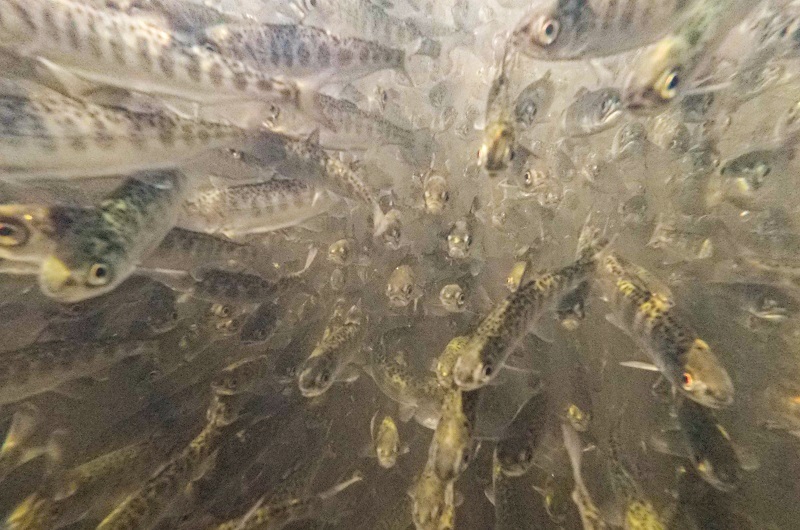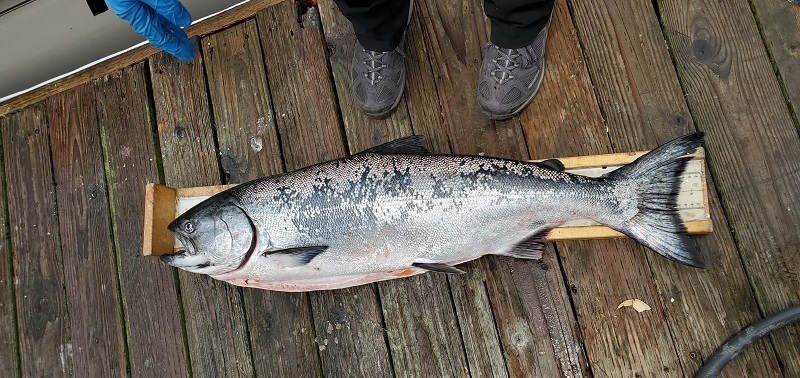From Sportfishing
Fish Report for 4-14-2023

CDFW Provides Nearly $36 Million for Projects to Save Salmon and Other California Fish and Wildlife Species
4-14-2023
California Department of Fish & Wildlife
The California Department of Fish and Wildlife (CDFW) today announced nearly $36 million in projects to benefit salmon and their habitats, and to further support climate resiliency, wildlife corridors and wetlands restoration.
Saving salmon and rebuilding their populations for future Californians involves many key actions including investing in and restoring salmon strongholds as climate refugia, increasing partnerships, working with Tribes, doing more large-scale restoration at a faster pace, modernizing old infrastructure and creating fish passage around migration barriers. Today’s awards invest in those types of salmon projects.
Salmon Strongholds: the Klamath, Scott and Shasta Rivers
CDFW is awarding $20 million in Drought Emergency Salmon Protection Grants to 10 projects demonstrating support from and collaboration with Tribes and landowner interests in the Shasta and Scott rivers and their watersheds. These include habitat improvement, removal of barriers to fish passage and groundwater recharge projects. CDFW is also awarding $9 million from the same fund to Tribes in the Klamath River mainstem for post-McKinney Fire debris flow damage remediation, slope and sediment stabilization, and restoration for salmonids.
“These projects will help us save our struggling salmon populations,” said CDFW Director Charlton H. Bonham. “The Klamath, Scott and Shasta rivers are historic salmon strongholds where this kind of restoration investment will make a big impact. Rebuilding these watersheds and reconnecting salmon within them is one step further toward salmon recovery. The investments to support these 10 projects is happening in parallel to the largest river restoration in America’s history now underway to remove four dams on the mainstem Klamath River.”
Climate Resiliency and Nature-Based Solutions
Additionally, CDFW is awarding $6.9 million to nine projects to further support nature-based solutions, climate resiliency, wildlife corridors and wetlands restoration.
“Each week, each month that passes by on the calendar, California’s climate challenges increase, change and present a need to implement projects designed to keep pace,” Bonham said. “We are matching this pace with ongoing funding commitments to new projects, moving away from a once-a-year announcement of awards to fund more projects, toward sustained momentum.”
Projects funded with these grants will go toward planning and implementation of wetlands and mountain meadows including expanding habitat for Lahontan cutthroat trout habitat on the Upper Truckee River, addressing urgent degrading water and habitat conditions due to climate change impacts in Shasta and Sonoma counties, and creating habitat connectivity through wildlife corridors funding for species such as Clear Lake hitch and newts, among other projects.
Next Steps
These projects will soon commence work. Meanwhile, CDFW will continue to accept applications for new projects and make awards on an ongoing basis with an emphasis on a strategic approach to rebuild salmon and other species by removing barriers to migration, improving water management and quality, restoring core salmon strongholds, taking substantial steps to modernize older infrastructure for salmon-friendly results and other actions.
Background
In late 2022 CDFW announced the availability of $200 million in new funding for restoration, including $100 million in emergency drought funding for protecting salmon against drought and climate change. Funding under the Addressing Climate Impacts and Nature-Based Solutions initiatives provides grant funding for projects addressing water and habitat impacted by climate, as well as restoring wetlands and mountain meadows, and creating wildlife corridors. On March 7, 2023, CDFW announced its first round of awards totaling $22.5 million for 19 projects from this funding.
This funding also supports key initiatives including conserving 30 percent of California’s lands and coastal waters by 2030 under California’s 30x30 initiative, Nature-Based Solutions and increasing the pace and scale of restoration through Cutting Green Tape.
California must get more restoration done at a faster pace. To achieve that goal, CDFW has developed a single set of General Grant Program Guidelines with an overview of eligible project types, priorities and information on the application process, available at www.wildlife.ca.gov/Conservation/Watersheds/Restoration-Grants/Concept-Application. Applications submitted under these new initiatives may also be considered for further evaluation under CDFW’s Proposition 1 and Proposition 68 Grant Programs, and a separate call for projects will also be released for these programs in Spring 2023.
More information about these funding opportunities, including guidelines and how to apply, general information about CDFW’s grant programs, as well as a schedule for upcoming grant solicitations, once available, can be found at www.wildlife.ca.gov/grants.
< Previous Report Next Report >
More Reports

4-14-2023
The California Department of Fish and Wildlife is proposing an emergency regulation change to reduce the recreational California halibut daily...... Read More

4-6-2023
Today, the Pacific Fishery Management Council (PFMC) acted unanimously to recommend a full closure of California’s commercial and recreational ocean...... Read More

Website Hosting and Design provided by TECK.net